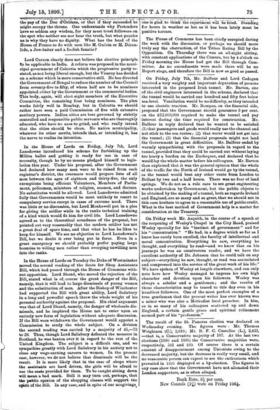In the House of Lords on Tuesday the Duke of
Westminster moved the second reading of the Seats for Shop Assistants Bill, which had passed through the House of Commons with- out opposition. Lord Shand, who moved the rejection of the Bill, stated what is of, course the great danger of the Bill, namely, that it will lead to large dismissals of young women and the substitution of men. After the Bishop of Winchester had supported the Bill with great ability, Lord Salisbury in a long and powerful speech threw the whole weight of his personal authority against the proposal. His chief argument was that of Lord Shand, namely, the danger of wholesale dis- missals, and he implored the House not to enter upon an entirely new form of legislation without adequate discussion. If the Bill were withdrawn the Government would appoint a Commission to study the whole subject. On a division the second reading was carried by a majority of 45,-73 to 28. Thus, though Lord Salisbury defeated the measure in Scotland, he was beaten over it in regard to the rest of the United Kingdom. The subject is a difficult one, and we sympathise greatly with Lord Salisbury in his anxiety not to close any wage-earning careers to women. In the present case, however, we do not believe that dismissals will be the result. It is more likely that in the case of shops where the assistants are hard driven, the girls will be afraid to use the seats provided for them. To be caught sitting down will mean a bad mark. Still it may turn out, perhaps, that the publics opinion of the shopping classes will support the spirit of the Bill. In any case, and in spite of our misgivings,
one is glad to think the experiment will be tried. Standing for hours in weather as hot as it has been lately must be positive torture.






































 Previous page
Previous page